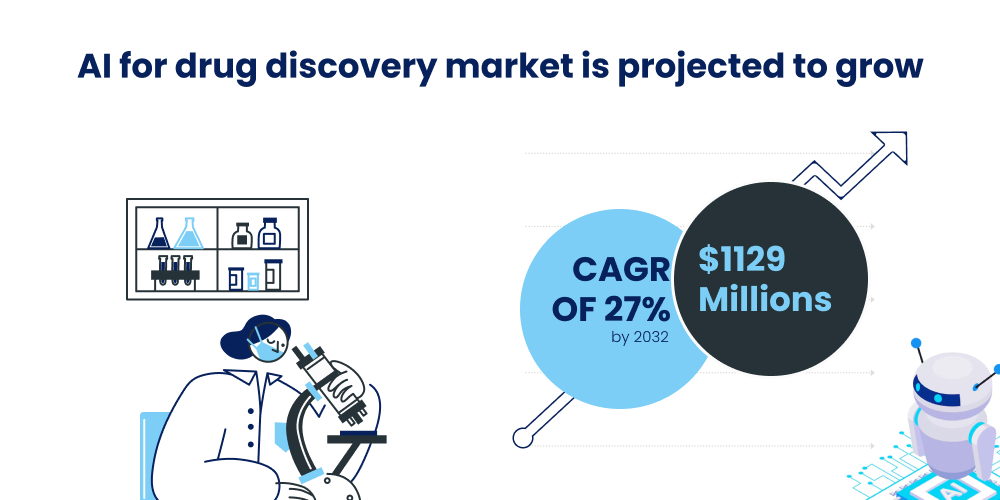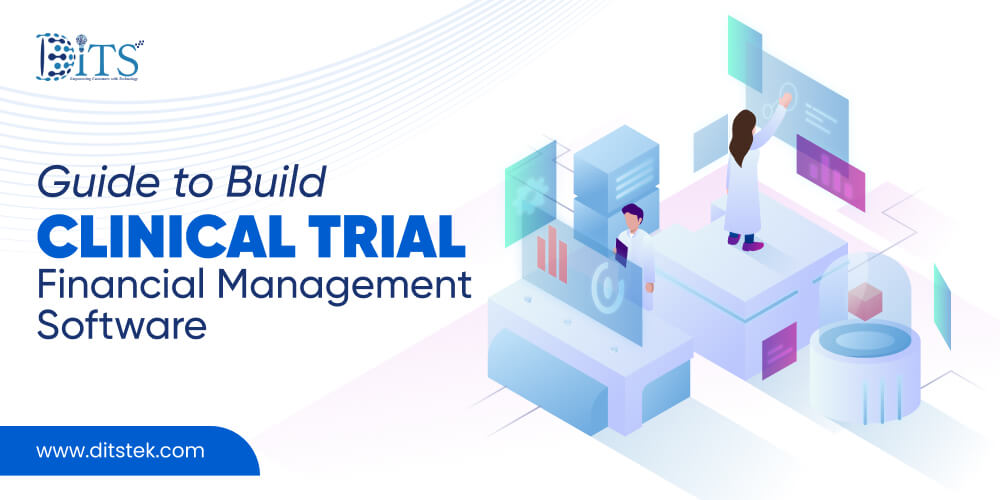What Is The Role Of Generative AI In Drug Discovery?
Table Of Content
Published Date :
24 Jul 2024
Finding medicines or drugs using traditional methods is not only difficult but also expensive and time consuming. It involves going through large chemical libraries and conducting numerous trial-and-error experiments to find suitable molecules.
Generative AI is reshaping every industry, including manufacturing, retail, transportation and healthcare. It is also significantly impacting the drug discovery domain. GenAI, with its ability to analyze large databases, generate novel molecular structures and accelerate drug discovery processes. It can also help predict the potential and biological impacts of drugs discovered with high accuracy.
In this blog, we will explore generative AI, its role, benefits, challenges and more in drug discovery.
What Is Generative AI?
Generative AI, also known as a subset of AI, is an advanced form of Artificial Intelligence. It is a class of machine learning models that can generate new data samples from learned patterns. It, built on large language models, is trained to generate relevant content in form of images, text, music and more by learning patterns from millions of pre-existing examples.
Generative AI can write essays, generate realistic images, compose music and assist in drug discovery. With the help of complex algorithms, Generative AI predicts molecular behavior and optimizes its performance using intricate calculations.
Generative AI includes:
- Generative Adversarial Networks (GANs): These help generate realistic data samples with the help of two neural networks known as generator and discriminator.
- Variational Autoencoders (VAEs): VAEs, like autoencoders, generate new data samples by encoding the input data into compressed form and then decoding it back to reconstruct the data.
- Transformer Models: These understand the complex relationships between atoms, thus help in generating molecular structures.
Generative AI Models can be categorized as:
- Text to Text (ChatGPT-4, Bard)
- Text to Speech (Vertex AI)
- Text to Video (Emu Video)
- Text to Audio (Voicebox)
- Text to Image (Adobe Firefly)
- Image to Text (Pix2Struct)
- Image to Image (SinCode AI)
- Image to Video (LeiaPix)
- Video to Video (Runway AI)
- And more.
Revolutionize drug discovery with Generative AI! Reach out to us for cutting-edge AI solutions that drive breakthroughs!
Why Invest In Generative AI?

- According to studies, the generative AI for drug discovery market is projected to grow at a CAGR of 27% by 2032 i.e. $1129 millions.
- According to a report by Gartner, implementing AI in business will increase organizational efficiency by 24.69%.
- About 75% of generative AI use cases value falls across four areas: Customer operations, marketing and sales, software engineering, and R&D.
What are Generative AI Drugs?
The use of Generative AI in drug discovery entails generating new molecules, compounds, and drug candidates based on specific criteria. Trained on extensive data sets—ranging from chemical structures and biological interactions to clinical trial outcomes, AI algorithms can design novel drug candidates with targeted properties and mechanisms.
Role of Generative AI in Each Stage of Drug Discovery Process

From initial research to post market surveillance, Generative AI impacts each stage of the drug discovery process.
Target Identification and Validation
Generative AI analyzes tremendous amounts of biological and clinical data to find and validate potential molecular targets linked to diseases. By predicting how genes, proteins, and pathways work and interact with each other, Generative AI offers valuable insights for targeting disease mechanisms.
Lead Discovery
AI models like ANNs and RNNs help discover new chemical structures during the lead discovery stage. They speed up finding lead compounds by making it easier to pick potential candidates and predict how they will bind and act pharmacologically.
Lead Optimization
AI can help optimize lead compounds by suggesting molecular changes to increase the efficacy and safety. This process is useful in developing medication candidates with better pharmacological characteristics and reduced possible side effects.
Preclinical Testing
In preclinical testing, generative AI analyzes large datasets for safety, efficiency, and toxicity. It can predict therapeutic outcomes, side effects, and minimize the need for using in vitro and in vivo testing.
Clinical Trials
AI has become mandatory in the planning as well as the execution of clinical trials. It analyzes patient information and clinical trial procedures in order to identify patients that might be suitable for the trials.
Regulatory Review
Generative AI technologies analyze large amounts of data in regulatory submissions and guarantee that applications for medication approval go through a thorough and comprehensive review.
Post-market Surveillance
AI systems complement the approval stage by providing real-time surveillance and immediate response to new findings through tracking any possible harms and safety issues.
Build A Generative AI Solution for Drug Discovery With DITS
Role Of Generative AI In Drug Discovery
Generative AI not only speeds up the process of drug discovery but also has various use cases, which are as follow:
Molecule Simulations
Generative AI is revolutionizing how we produce novel chemical compounds and molecular structures within silico testing. This advanced method reduces the need for physical testing by carrying out high-precision chemical simulations on computers. By accurately predicting molecular interactions, behaviors, and binding affinities, generative AI improves the assessment process of potential therapeutic options.
This approach cuts down the high costs associated with traditional lab-based chemical research. Generative AI allows researchers to quickly and thoroughly assess possible compounds, eliminating the need for costly and time-consuming physical testing, thus accelerating the drug development process.
Drugs Optimization
Generative AI is changing the game in drug development by suggesting precise modifications to existing drug compounds. This advanced technology aims to boost the therapeutic effectiveness, safety, and key pharmacological properties such as solubility and binding affinity of medications.
With generative AI, the drug development process becomes more efficient, significantly reducing the time and resources traditionally required for drug optimization. Researchers can quickly evaluate numerous AI-suggested modifications to find the most promising ones, accelerating the journey to better medications and reducing the risks associated with creating new drugs.
Data-driven Patient Stratification
Generative AI for data-driven patient stratification is a game-changer in healthcare. Advanced algorithms analyze vast amounts of patient data and classify patients into subgroups based on their predicted responses to various drugs. By understanding each patient's unique characteristics and genetic profiles, healthcare providers can personalize treatments, making them more precise and effective. This personalized approach improves patient outcomes and minimizes potential side effects.
De Novo Drug Design
Generative AI greatly accelerates drug design by rapidly creating novel drug candidates from scratch. It employs advanced algorithms to evaluate and refine these compounds based on key factors like chemical viability, binding affinity, and toxicity profiles.
This modern approach helps researchers quickly identify promising compounds for further study, enhancing and speeding up the drug development process. With its ability to generate and assess molecular structures more efficiently than traditional methods, generative AI reduces both the time and cost of developing new drugs, making the entire process more effective and innovative.
Virtual Screening
Generative AI in medicine revolutionizes the drug discovery process with its advanced virtual screening capabilities. With its advanced computer modeling feature, Generative AI can simulate interactions between potential drug candidates and target proteins. This means researchers can evaluate and filter a broad array of molecules for biological activity without the need for physical tests. The result? A faster, more cost-effective drug development process that efficiently weeds out less promising candidates.
Multi-Target Drug Discovery
AI-generated drugs use a polypharmacological strategy to target multiple molecules at once to improve effectiveness and potentially overcome resistance. By mastering the complex web of biological interactions, AI not only speeds up drug discovery but also enables the design of groundbreaking, synergistic therapies that could transform cancer care and complex conditions treatment.
Compound Library Expansion
Generative AI contributes to expanding compound libraries with fresh, innovative molecules. By analyzing existing compounds and their structure-activity relationships (SAR), AI uses machine learning to propose innovative analogs and derivatives. By synthesizing and testing these AI-suggested compounds, scientists can more efficiently find promising drug candidates and optimize existing leads. This iterative approach not only accelerates drug discovery but also saves resources and continually refines the compound library, paving the way for groundbreaking therapeutic advancements.
Apart from the use cases mentioned above, Generative AI in drug discovery can also help in predicting ADME (Absorption, Distribution, Metabolism, and Excretion) properties, discovering biomarkers, predicting drug combinations, forecasting potential side effects, and analyzing biological pathways, among other applications.
Also Read: LLM Vs NLP Vs Generative AI
Benefits of Generative AI in Drug Discovery

McKinsey analysts predict Generative AI to add around $15-28 billion annually to the drug discovery industry. It offers numerous benefits which are as follow:
Accelerating Compound Generation
Generative AI accelerates compound generation by suggesting novel compounds based on existing datasets and knowledge, significantly speeding up the drug discovery process and reducing the trial-and-error cycle.
Enhancing Clinical Trials
The journey of new drugs from the lab to the market involves rigorous clinical trials to ensure their safety and efficacy. Generative AI can revolutionize this process by identifying groups of people who are likely to respond well to the drug. By identifying participants with specific genetic markers, Generative AI makes clinical trials more efficient and targeted, which helps streamline the entire process and speeds up the time it takes to bring new treatments to market.
Cost and Time Savings
Generative AI streamlines the drug discovery pipeline, significantly reducing the cost of experimental iterations and accelerating the time it takes to bring new drugs to market.
Enabling Customization
Generative AI has the ability to study the genetic profiles to determine how patients might react to certain types of drugs. It can also help healthcare providers identify biomarkers indicating the disease stage and severity.
Also Read: Types of Popular Patient Healthcare Apps
Challenges of Using Generative AI in Drug Discovery
While Generative AI offers exciting possibilities for drug discovery, it comes with its own set of challenges. This technology doesn’t simply work out of the box; it requires careful setup and thoughtful interaction to be truly effective.
Technically, anyone can type a query into a chat box and get a response. However, obtaining valuable and actionable results from Generative AI requires well-crafted prompts to guide the technology correctly.
Some basic challenges include:
Data quality: Generative AI relies on existing data for training. If the input data is poor, the output will also be poor. Poor data can result in poor models and inaccurate predictions.
Complexity: Getting approvals in the drug discovery industry is essential, but explaining Generative AI’s complex processes can be challenging. It may slow down the approval process until pioneering companies develop templates that others can follow.
Misuse: Personalized drugs are beneficial but could become controversial if they exclude too many people. Drugs should ideally work for everyone, not just those with specific genetic markers.
Privacy: Handling patient information in AI systems can lead to legal issues under HIPAA and other privacy regulations. Ensuring compliance with these regulations is essential for protecting patient data. Implementing responsible AI practices ensures compliance with legal and ethical standards, prioritizing patient privacy and data security.
Additionally, accessing a Generative AI system with the right data can be costly. Fortunately, companies are now creating Generative AI softwares tailored specifically for Drug Discovery, making this advanced technology more accessible.
Also Read: How To Build A Conversational AI
Traditional Drug Discovery vs Generative AI-powered Drug Discovery
Here's a table outlining the differences between traditional drug discovery and generative AI-powered drug discovery:
| Aspect |
Traditional Drug Discovery |
Generative AI-Powered Drug Discovery |
| Process | Sequential and iterative | Data-driven and automated |
| Effort | Labor-intensive; manual experiment design and testing | Automated; algorithms generate molecules and trial protocols |
| Timeline | Time-consuming; typically takes years | Fast and automated; can be completed in a fraction of the time |
| Cost | Very expensive; often billions of dollars | Much cheaper; can achieve results at a fraction of the cost |
| Data Integration | Limited to experimental data and known compounds | Utilizes extensive datasets including genomics, chemical compounds, clinical data, literature, and more |
| Target Selection | Limited exploration; uses predetermined targets | Can explore multiple alternative targets for experimentation |
| Personalization | Focuses on broader populations; less tailored | High personalization; uses patient data to focus on tailored drug candidates |
Contact us Generative AI experts to Build AI-powered Software Solutions For Your Business!
Conclusion
Generative AI can supercharge your drug discovery efforts, delivering faster results and cost savings while creating more effective, personalized drugs. But the journey doesn’t stop at selecting the right model. The real magic happens when you integrate it seamlessly into your workflows and ensure it has access to high-quality data. That’s where we come in. DITS offers expertise in model training, seamless integration, and secure data management. Contact us to harness the power of Generative AI and elevate your drug discovery process!
FAQs
Can generative AI really transform drug discovery?
Absolutely. Generative AI can transform drug discovery by making the process faster, cheaper, and more efficient. Unlike traditional methods, which are slow and costly, AI automates compound creation and trial protocols, making the entire process faster and more affordable. AI leverages extensive datasets and advanced algorithms to explore multiple hypotheses, select diverse targets, and personalize drug candidates based on patient data. This game-changing technology is transforming how we discover and develop new drugs, leading to quicker, more effective treatments tailored to individual needs.
What are the challenges of using Gen AI in drug discovery?
The challenges in using generative AI for drug discovery may include lack of model explainability, model hallucination and inaccuracy, limited generalization, infrastructure and computational costs.

Nidhi Thakur
With more than 19 years of experience - I represent a team of professionals that specializes in the healthcare and business and workflow automation domains. The team consists of experienced full-stack developers supported by senior system analysts who have developed multiple bespoke applications for Healthcare, Business Automation, Retail, IOT, Ed-tech domains for startups and Enterprise Level clients.
Recent Posts

AI in agriculture helps improve efficiency, soil health, crop production and reduce costs by up to 30%. Read our blog to know in detail.

Looking to outsource your next project? Learn how to outsource software development without sacrificing quality. Find the right team, avoid pitfalls, and boost project success.

A practical development guide to building clinical trial financial management software with compliance-first design, integrations, automation, and scalable architecture for research organizations.